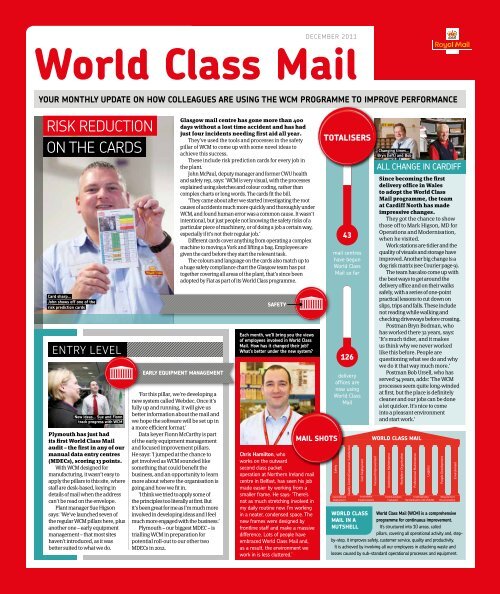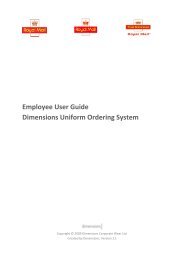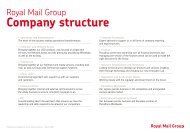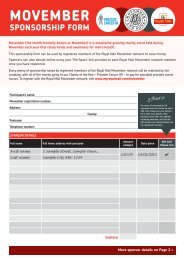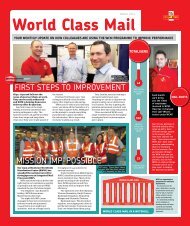WCM December 2011 Insert.pdf - myroyalmail
WCM December 2011 Insert.pdf - myroyalmail
WCM December 2011 Insert.pdf - myroyalmail
You also want an ePaper? Increase the reach of your titles
YUMPU automatically turns print PDFs into web optimized ePapers that Google loves.
DECEMBER <strong>2011</strong><br />
World Class Mail<br />
your monthly update on how colleagues are using the WCm programme to improve performance<br />
RISK REDUCTION<br />
ON THE CARDS<br />
Card sharp...<br />
John shows off one of the<br />
risk prediction cards<br />
entry level<br />
New ideas... Sue and Fionn<br />
track progress with <strong>WCM</strong><br />
Plymouth has just had<br />
its first World Class Mail<br />
audit – the first in any of our<br />
manual data entry centres<br />
(MDECs), scoring 13 points.<br />
With <strong>WCM</strong> designed for<br />
manufacturing, it wasn’t easy to<br />
apply the pillars to this site, where<br />
staff are desk-based, keying in<br />
details of mail when the address<br />
can’t be read on the envelope.<br />
Plant manager Sue Higson<br />
says: ‘We’ve launched seven of<br />
the regular <strong>WCM</strong> pillars here, plus<br />
another one – early equipment<br />
management – that most sites<br />
haven’t introduced, as it was<br />
better suited to what we do.<br />
‘For this pillar, we’re developing a<br />
new system called Webdec. Once it’s<br />
fully up and running, it will give us<br />
better information about the mail and<br />
we hope the software will be set up in<br />
a more efficient format.’<br />
Data keyer Fionn McCarthy is part<br />
of the early equipment management<br />
and focused improvement pillars.<br />
He says: ‘I jumped at the chance to<br />
get involved as <strong>WCM</strong> sounded like<br />
something that could benefit the<br />
business, and an opportunity to learn<br />
more about where the organisation is<br />
going and how we fit in.<br />
‘I think we tried to apply some of<br />
the principles too literally at first. But<br />
it’s been great for me as I’m much more<br />
involved in developing ideas and I feel<br />
much more engaged with the business.’<br />
Plymouth – our biggest MDEC – is<br />
trialling <strong>WCM</strong> in preparation for<br />
potential roll-out to our other two<br />
MDECs in 2012.<br />
Glasgow mail centre has gone more than 400<br />
days without a lost time accident and has had<br />
just four incidents needing first aid all year.<br />
They’ve used the tools and processes in the safety<br />
pillar of <strong>WCM</strong> to come up with some novel ideas to<br />
achieve this success.<br />
These include risk prediction cards for every job in<br />
the plant.<br />
John McPaul, deputy manager and former CWU health<br />
and safety rep, says: ‘<strong>WCM</strong> is very visual, with the processes<br />
explained using sketches and colour coding, rather than<br />
complex charts or long words. The cards fit the bill.<br />
‘They came about after we started investigating the root<br />
causes of accidents much more quickly and thoroughly under<br />
<strong>WCM</strong>, and found human error was a common cause. It wasn’t<br />
intentional, but just people not knowing the safety risks of a<br />
particular piece of machinery, or of doing a job a certain way,<br />
especially if it’s not their regular job.’<br />
Different cards cover anything from operating a complex<br />
machine to moving a York and lifting a bag. Employees are<br />
given the card before they start the relevant task.<br />
The colours and language on the cards also match up to<br />
a huge safety compliance chart the Glasgow team has put<br />
together covering all areas of the plant, that’s since been<br />
adopted by Fiat as part of its World Class programme.<br />
Early Equipment Management<br />
Safety<br />
Each month, we’ll bring you the views<br />
of employees involved in World Class<br />
Mail. How has it changed their job?<br />
What’s better under the new system?<br />
Chris Hamilton, who<br />
works on the outward<br />
second class packet<br />
operation at Northern Ireland mail<br />
centre in Belfast, has seen his job<br />
made easier by working from a<br />
smaller frame. He says: ‘There’s<br />
not as much stretching involved in<br />
my daily routine now I’m working<br />
in a neater, condensed space. The<br />
new frames were designed by<br />
frontline staff and make a massive<br />
difference. Lots of people have<br />
embraced World Class Mail and,<br />
as a result, the environment we<br />
work in is less cluttered.’<br />
MAIL SHOTS<br />
TOTALISERS<br />
43<br />
mail centres<br />
have begun<br />
World Class<br />
Mail so far<br />
126<br />
delivery<br />
offices are<br />
now using<br />
World Class<br />
Mail<br />
Safety<br />
Commitment<br />
Deployment<br />
Quality Control/Customer Satisfaction<br />
Cost Deployment<br />
World Class<br />
Mail in a<br />
nutshell<br />
Changing times…<br />
Bryn (left) and Bob<br />
all change in cardiff<br />
Since becoming the first<br />
delivery office in Wales<br />
to adopt the World Class<br />
Mail programme, the team<br />
at Cardiff North has made<br />
impressive changes.<br />
They got the chance to show<br />
those off to Mark Higson, MD for<br />
Operations and Modernisation,<br />
when he visited.<br />
Work stations are tidier and the<br />
quality of visuals and storage have<br />
improved. Another big change is a<br />
dog risk matrix (see Courier page 9).<br />
The team has also come up with<br />
the best ways to get around the<br />
delivery office and on their walks<br />
safely, with a series of one-point<br />
practical lessons to cut down on<br />
slips, trips and falls. These include<br />
not reading while walking and<br />
checking driveways before crossing.<br />
Postman Bryn Bodman, who<br />
has worked there 32 years, says:<br />
‘It’s much tidier, and it makes<br />
us think why we never worked<br />
like this before. People are<br />
questioning what we do and why<br />
we do it that way much more.’<br />
Postman Bob Ursell, who has<br />
served 34 years, adds: ‘The <strong>WCM</strong><br />
processes seem quite long-winded<br />
at first, but the place is definitely<br />
cleaner and our jobs can be done<br />
a lot quicker. It’s nice to come<br />
into a pleasant environment<br />
and start work.’<br />
WORLD TW CLASS MAIL<br />
GU RH<br />
Focused I m p rovement<br />
Involvement<br />
Implementation<br />
Autonomous Maintenance<br />
World Class Mail (<strong>WCM</strong>) is a comprehensive<br />
programme for continuous improvement.<br />
It’s structured into 10 areas, called<br />
pillars, covering all operational activity and, stepby-step,<br />
it improves safety, customer service, quality and productivity.<br />
It is achieved by involving all our employees in attacking waste and<br />
losses caused by sub-standard operational processes and equipment.<br />
Workplace Organisation<br />
Communication<br />
Evaluation<br />
Professional Maintenance<br />
Logistics<br />
Understanding<br />
Standardisation with Visibility<br />
People Development<br />
Environment<br />
Measurement<br />
Documentation
Widget works<br />
wonders<br />
Ingenious…<br />
Karthick<br />
with the new<br />
‘widget’<br />
Safety<br />
A brand new ‘widget’ created at<br />
Heathrow Worldwide Distribution<br />
Centre is revolutionising the way<br />
maintenance is done on IMPs<br />
(integrated mail processors).<br />
Focused Improvement (FI) pillar lead<br />
Karthik Kannan developed the device.<br />
He says: ‘Take one tiny piece of kit and<br />
install it on every IMP in our business, and you’ll<br />
save thousands of engineering hours.<br />
‘Each time one of the blade diverters wore<br />
out on the IMP, it would take 35 minutes to<br />
change and had to be done by an engineer.’<br />
As part of the FI process and using a<br />
technique of error-proofing called ‘pokayoke’,<br />
Karthik designed a tiny piece of kit that means<br />
blades can be changed by operators in just 30<br />
seconds.<br />
‘The widget is a plate installed once by the<br />
engineers under each blade, so a replacement<br />
blade can only be installed in the correct way,<br />
with just one screw and a spring for the operator<br />
to adjust,’ he explains.<br />
‘We calculated that 183,000 diverter blades<br />
have been changed in the last five years, and<br />
each one took an engineer 35 minutes – that’s a<br />
lot of time saved in the future.<br />
‘We worked with a local manufacturer that’s<br />
now an approved supplier, and the component<br />
is now available to all engineering teams.’<br />
CARDIFF SEEKS<br />
SILVER<br />
Silver seekers… there’s no<br />
stopping the Cardiff team<br />
The team at Cardiff mail centre<br />
is on the road to achieving silver<br />
status as a World Class Mail<br />
centre.<br />
They were one of the first to introduce<br />
the programme in 2008 and earned their<br />
bronze award in October last year.<br />
Currently on 50 points, the centre is<br />
hoping to reach the required 60 for 2012<br />
and be the first in the UK to make it.<br />
Postman Shafiq Rehman says: ‘Many<br />
people here make regular suggestions<br />
for improvements as part of World Class<br />
FOCUSED IMPROVEMENT<br />
Mail. It makes the working environment<br />
better for us and is good for the<br />
company.’<br />
Mail centre manager Rhian Edwards<br />
says: ‘We’re immensely proud to have<br />
already reached bronze status. It’s a great<br />
achievement and means a lot to us, but<br />
we don’t plan on stopping there.’<br />
To achieve silver, they need to<br />
increase the number of model areas and<br />
how many people are actively involved,<br />
reduce customer complaints and days<br />
lost by accidents.<br />
safety snapshot<br />
Acting on feedback...<br />
Avtar says the<br />
results were valuable<br />
Nearly three-quarters of International<br />
Operations employees took part in a safety<br />
climate survey, giving an excellent snapshot of<br />
the perceived safety culture.<br />
The paper-based survey, carried out during Work<br />
Time Listening and Learning sessions, asked 43 detailed<br />
questions covering nine different safety areas, including<br />
management commitment, communications, whether the<br />
working environment supports employee safety and how<br />
involved employees are in safety issues.<br />
The questions were based on a Health and Safety<br />
Executive (HSE) approved Safety Climate Tool. It was<br />
sponsored by International safety director James Radley<br />
and approved by the CWU and CMA unions.<br />
Avtar Soor, International Operations engineering safety<br />
advisor, says: ‘We wanted to understand what the staff feel<br />
the safety culture is like in International.<br />
‘The 74% response rate was fantastic. It obviously<br />
matters to people, and their answers were really valuable.<br />
‘We’ve broken the results down by International<br />
units, Heathrow Worldwide Distribution Centre units and<br />
maintenance engineering, so each one can focus on the<br />
action areas specific to them. They’ve all had a presentation<br />
about their results, and they are being discussed in Work<br />
Time Listening and Learning sessions, so teams can come<br />
up with solutions together, and at the site safety committee<br />
meetings. We want people to feel involved and their views<br />
acted on.’<br />
The survey will be repeated in two years to measure<br />
progress.<br />
Contact Avtar.Soor@royalmail.com to find out more<br />
about how International Operations set up its survey.<br />
CLEAN MACHINE<br />
Mucking in...<br />
the <strong>WCM</strong> team at Mount<br />
Pleasant is up for a challenge<br />
The World Class Mail team at<br />
London’s Mount Pleasant mail<br />
centre is pulling out all the<br />
stops to keep machines and<br />
workplaces tip-top, despite<br />
being in the middle of the site’s<br />
redevelopment work.<br />
They’ve come up with a new<br />
plastic hinge with an easy release<br />
mechanism for the CFCs that makes it<br />
easier to access a particular part of the<br />
machine to get rid of ink spatter and<br />
keep it clean.<br />
‘Our target is to cut the time we<br />
spend cleaning the machines by 90%.<br />
Autonomous Maintenance<br />
It’s hard to work on the machines<br />
with the amount of building work<br />
going on and the dust, but now the<br />
ground floor is almost complete this<br />
work can really take off,’ says machine<br />
operator Zain Patel.<br />
‘I’ve loved being part of <strong>WCM</strong> since<br />
we started the journey in January,’<br />
says machine operator Ruby Nidoy.<br />
‘We’re learning new skills, and<br />
coming up with our own ways to keep<br />
the machines running better with<br />
fewer minor stops. Our views are<br />
listened to and it makes this a much<br />
more satisfying job.’<br />
OVER<br />
TO<br />
you<br />
Got a World Class Mail<br />
success story or suggestion<br />
you’d like to share? Let us<br />
know and you might be<br />
featured next time.<br />
Email worldclass@<br />
abcomm.co.uk or call us<br />
on 020 7922 5670


